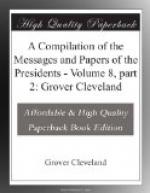Under these circumstances, and considering that the several provisions of the act of March 25, 1804, will cease in consequence of the ratification of the treaty of peace with Tripoli, now advised and consented to by the Senate, I have thought it my duty to communicate these facts, in order that Congress may consider the expediency of continuing the same provisions for a limited time or making others equivalent.
TH. JEFFERSON.
APRIL 15, 1806.
To the Senate and House of Representatives of the United States:
The Senate having advised and consented to the ratification of a treaty concluded with the Piankeshaw Indians for extinguishing their claim to the country between the Wabash and Kaskaskia cessions, it is now laid before both Houses for the exercise of their constitutional powers as to the means of fulfilling it on our part.
TH. JEFFERSON.
APRIL 17, 1806.
To the Senate and House of Representatives of the United States:
The Senate having advised and consented to the ratification of a convention between the United States and the Cherokee Indians, concluded at Washington on the 7th day of January last, for the cession of their right to the tract of country therein described, it is now laid before both Houses of Congress for the exercise of their constitutional powers toward the fulfillment thereof.
TH. JEFFERSON.
APRIL 18, 1806.
To the Senate of the United States:
In compliance with the request of the Senate of yesterday’s date, I now communicate the entire correspondence between the ambassador of Tunis and the Secretary of State, from which the Senate will see that the first application by the ambassador for restitution of the vessels taken in violation of blockade having been yielded to, the only remaining cause of difference brought forward by him is the requisition of a present of naval stores to secure a peace for three years, after which the inference is obvious that a renewal of the presents is to be expected to renew the prolongation of peace for another term. But this demand has been pressed in verbal conferences much more explicitly and pertinaciously than appears in the written correspondence. To save the delay of copying, some originals are inclosed, with a request that they be returned.
TH. JEFFERSON.
APRIL 19, 1806.
To the Senate of the United States:
I nominate James Monroe, now minister plenipotentiary of the United States at the Court of London, and William Pinkney, of Maryland, to be commissioners plenipotentiary and extraordinary for settling all matters of difference between the United States and the United Kingdoms of Great Britain and Ireland relative to wrongs committed between the parties on the high seas or other waters, and for establishing the principles of navigation and commerce between them.




